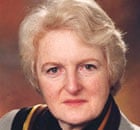JONATHAN FREEDLAND

Columnist for the Guardian and the Jewish Chronicle
Britain's Jews are a success story. They are comfortable and well-integrated, confident that these days no area is closed off to them: individual Jews have reached the top in the law, politics, business, entertainment and academe.
Yet they are not free of anxiety. Internal worries are bound to fill the in-tray of the new chief rabbi. Can orthodox Judaism accommodate demands by women for equality in synagogue? Can this still-tiny community remain united despite its multiple strands, the fastest-growing of which – ultra-orthodoxy – has next to no relationship with the others? Will the next generation want to remain Jewish at all?
Jews sense danger from without too. Antisemitism remains real and present; not for nothing does every Jewish school in the country have a security guard on the door. And Jews' place in Britain is often complicated by their – our - relationship with Israel. When hostility to that country rises, as it has in recent years, British Jews feel the impact. They are not responsible for the action Israel takes, yet they feel bound up with its fate and its people. They can't help but take attacks on Israel personally. As the laureate of Anglo-Jewry, the novelist Howard Jacobson, puts it, when British Jews look at Israel, "they see a version of themselves
JAMES
EDER

Founder of The Beans Group, studentbeans.com
Young people are the future of our community. The key challenge is how to engage and empower young Jewish people to get involved in a bigger way. In modern life there are lots of distractions, and there is a perception that every generation becomes less connected to our history.
With the social pressures around us to fit in, it is important for British Jews to remain connected and grounded by our roots. For me it is about keeping traditions alive, while modernising to adapt to the changing globalised world we now live in. To do this effectively, it is about supporting the community leaders of today, and simultaneously developing the leaders of tomorrow.
Working in the student space, we know that Jewish societies at universities still play a key role, even though there are certain cities where numbers have dropped. Bristol's Hillel House hall of residence closed in 2005 because of low demand, but eight years later and it's reopening, in response to a rise in Jewish students applying to study in the city.

MAUREEN
LIPMAN
Actress
If I were to say that the biggest issue facing the Jewish community today is increasing antisemitism cloaked in the more acceptable form of anti-Zionism, many of your readers would say, after Mandy Rice-Davis: "Well, she would say that, wouldn't she?"
Well, yes, I would, because history shows us, time after time, that when the economy bites, the Jews invariably get the toothmark. We assimilate so readily in the diaspora that we fail to stay vigilant.
Our television is loaded with Jewish satire which brings us into the warm cuddly mainstream while leftwing newspapers increasingly berate Israel and a magazine like the Oldie rarely lets an issue go by without some ghastly mention of Jewish millionaire lobbies.
Simon Schama is brilliantly showing us that history isn't just the story of the dead but the story of the living and, sadly, living Jews can never truly relax.

JULIA
NEUBERGER
Liberal Democrat peer, writer and rabbi at West London
synagogue
We need to live up to new chief rabbi Mirvis's message to work together- and his deliberate and welcome inclusiveness. Can we stop arguing among ourselves? Internationally, we need to challenge the Jewish Agency for Israel's statement that all Ethiopian Jews (the Falash Mura) have now been taken to Israel, when some 7,000 people who claim Jewish roots have been abandoned in Ethiopia, and need help.
Locally, we need to extend our excellent care for our growing numbers of older people living alone, and recognise how lonely they can be. We need to work with other faith groups within the UK and, in a very unsettled Middle East, we need to work with all sides to support Israel's democracy, protect everyone's human rights and bring about lasting peace with the Palestinians.

NOREENA
HERTZ
Author of Eyes Wide Open: How to Make Smart Decisions in a Confusing World
The rise in antisemitism in Europe is a big issue. In 2012 there was a 58% increase in antisemitic incidents in France; in Spain 53% of people surveyed expressed antisemitic views.
While in the UK not only was last year the third worst year on record for antisemitic hate crimes, but we are increasingly seeing antisemitism dressed up as criticism of Israel. While Israel is not a state beyond reproach, I find it both worrying and depressing that the only truly democratic state in the Middle East - and one with a free press - is increasingly the subject of academic and cultural boycotts.

LINDA
GRANT
Novelist and winner of the Orange prize for Fiction
Last month my nephew married his Iranian-Canadian fiancée, whom he met in a club in Hoxton. The ceremony was a Jewish-Persian mashup devised by themselves and presided over by a gay rabbi.
The challenge facing the mainstream Jewish community is to recognise that in an age of identity politics, Jewish identity is stronger than it has been since the 1950s, but is taking new and experimental forms. This won't satisfy religious purists but part of the essence of Jewishness (as well as Judaism) is its ability to transform itself to meet new times and new places.
